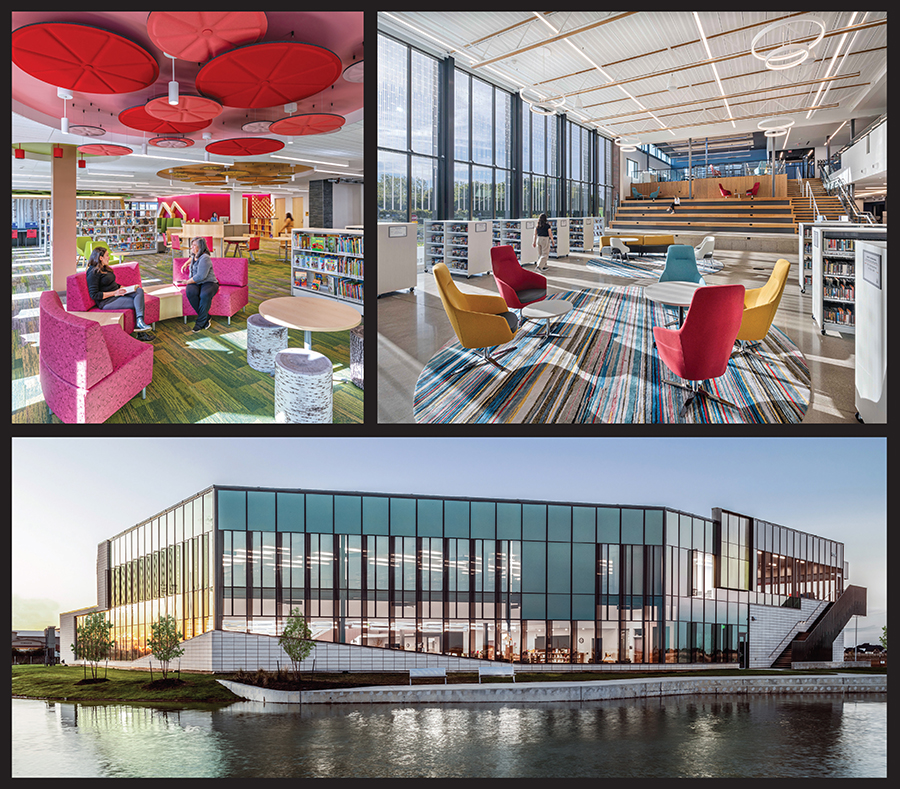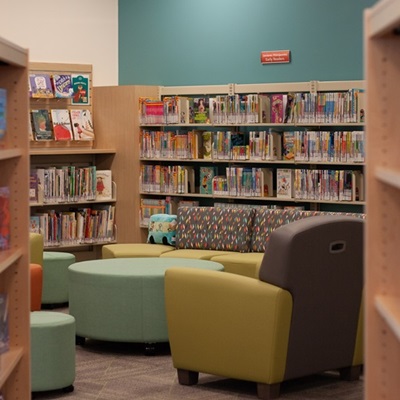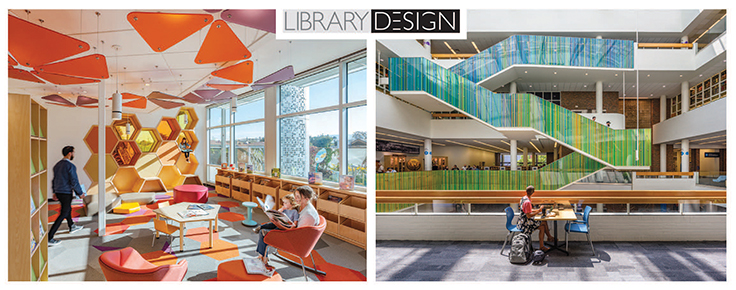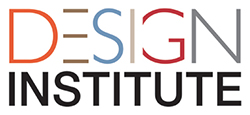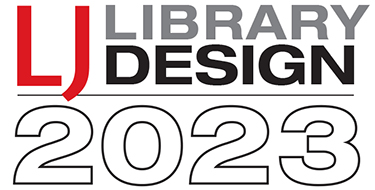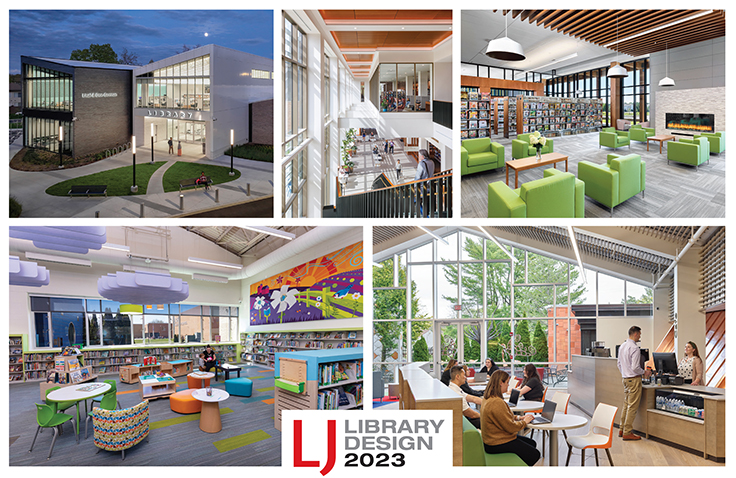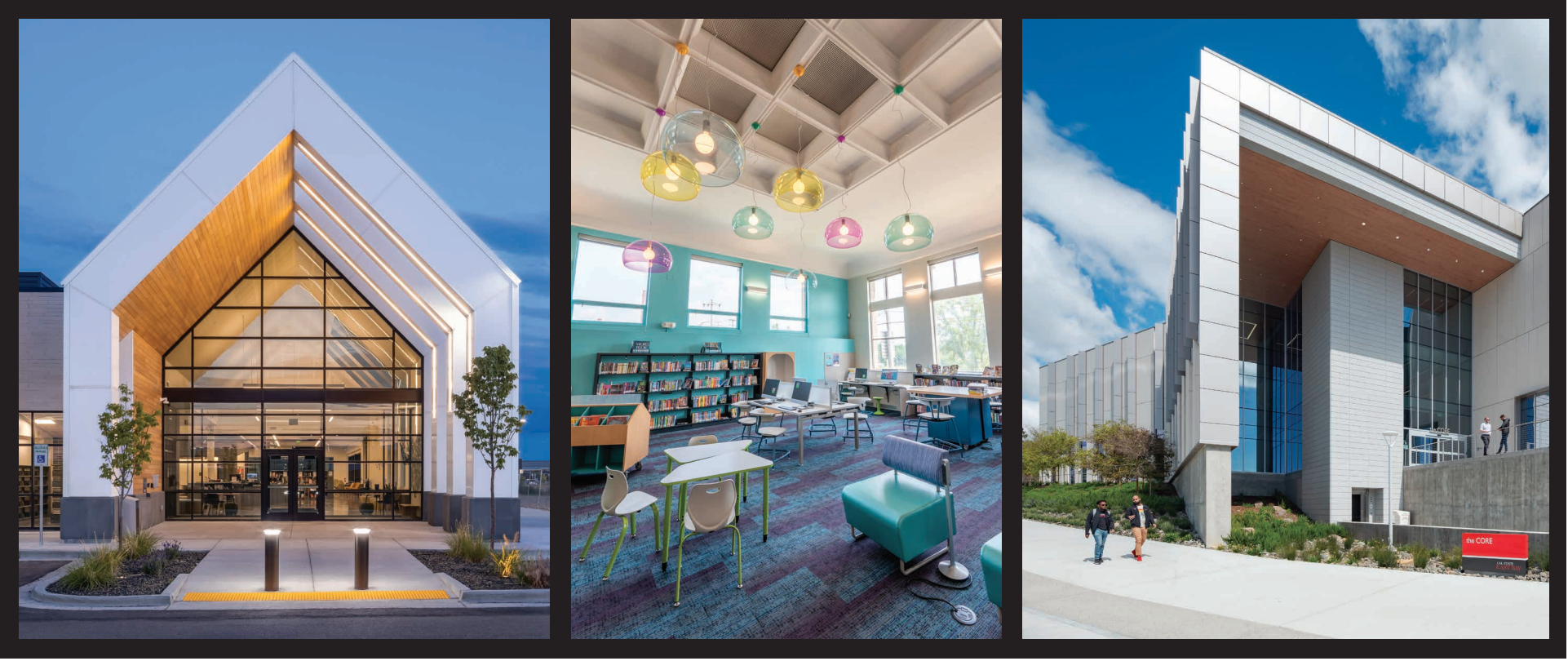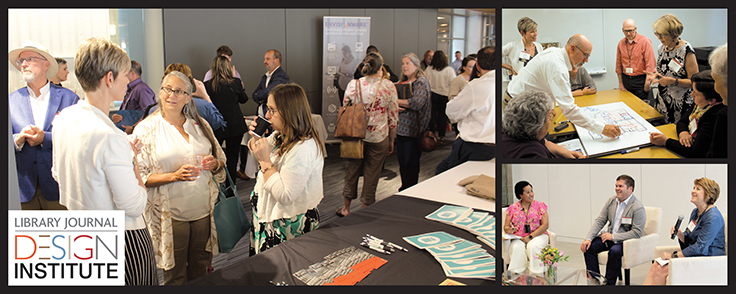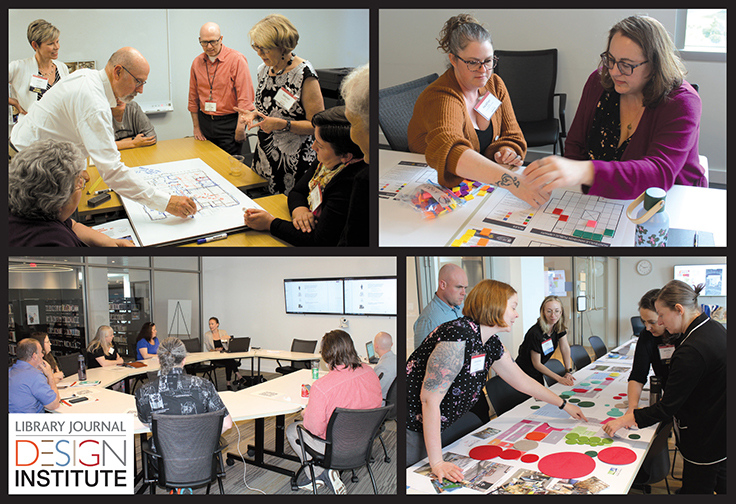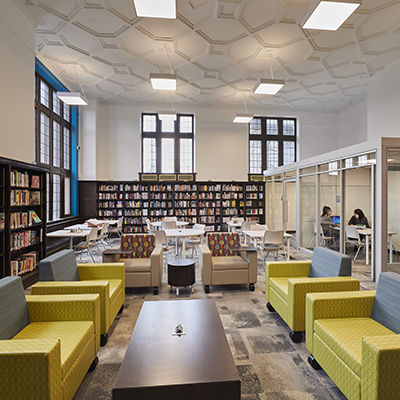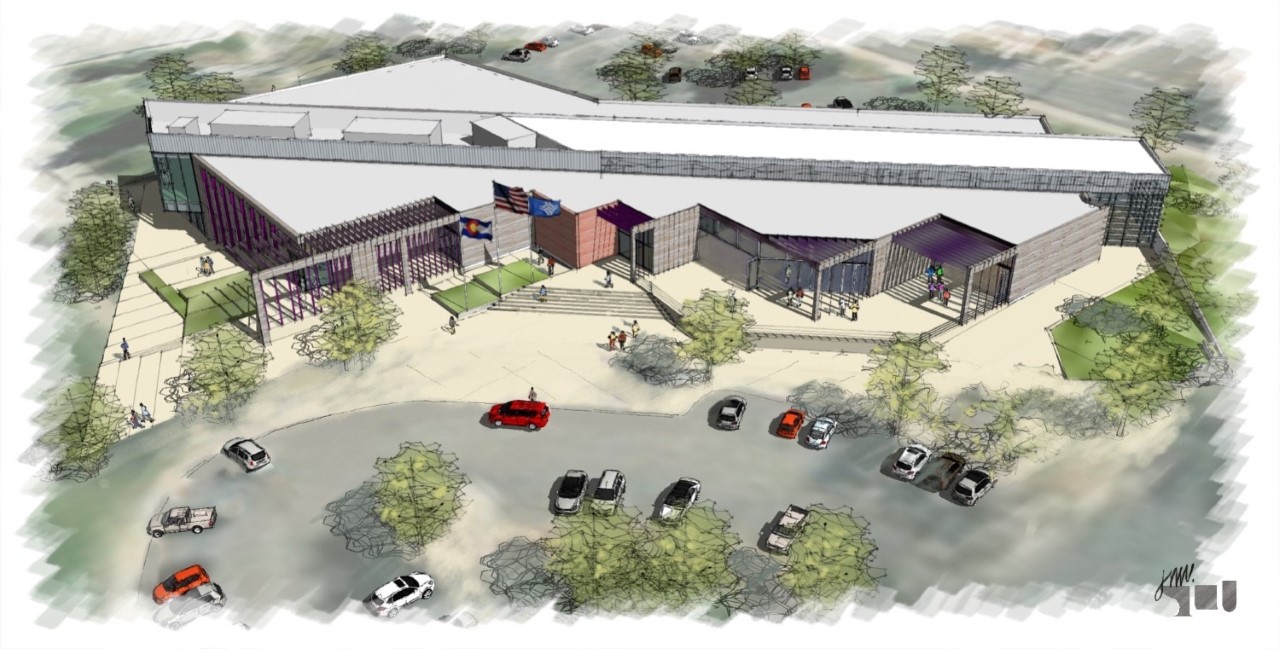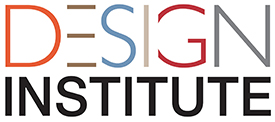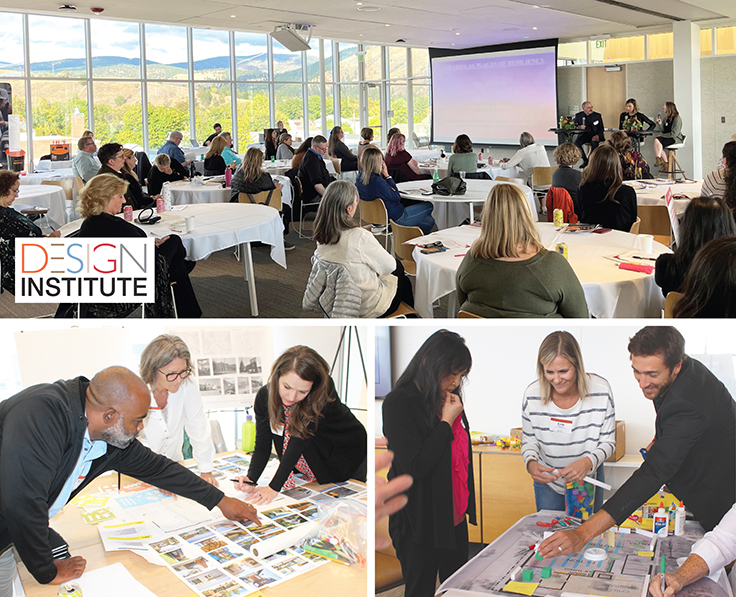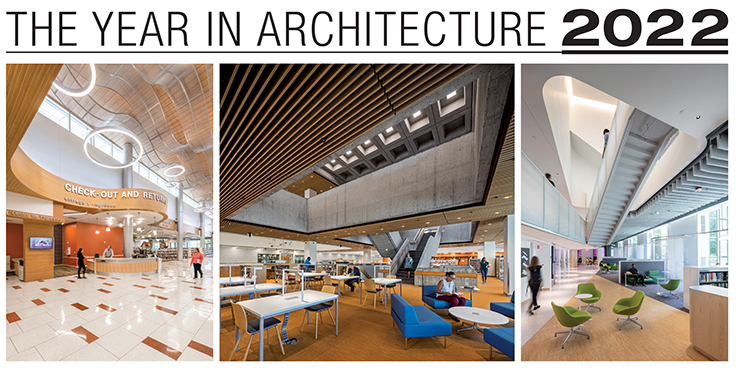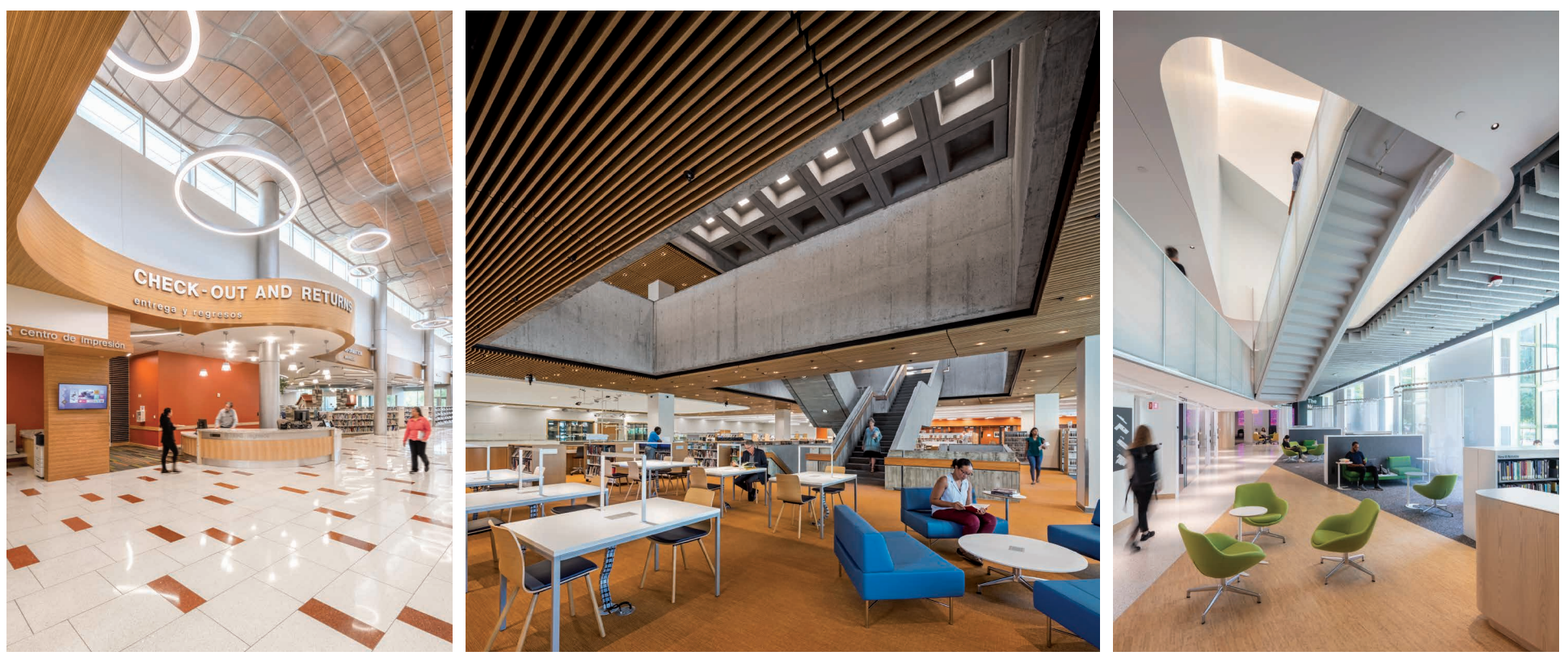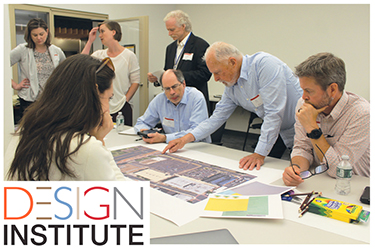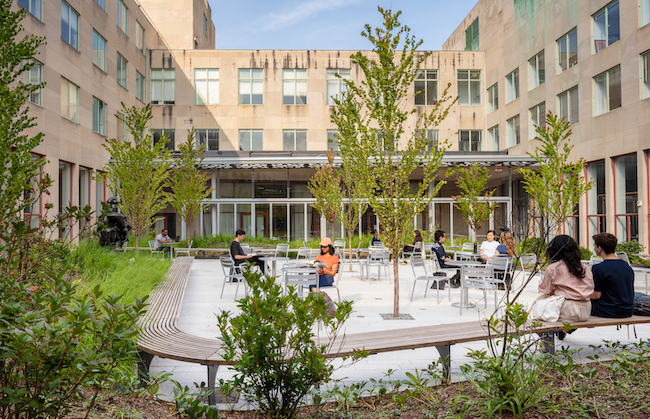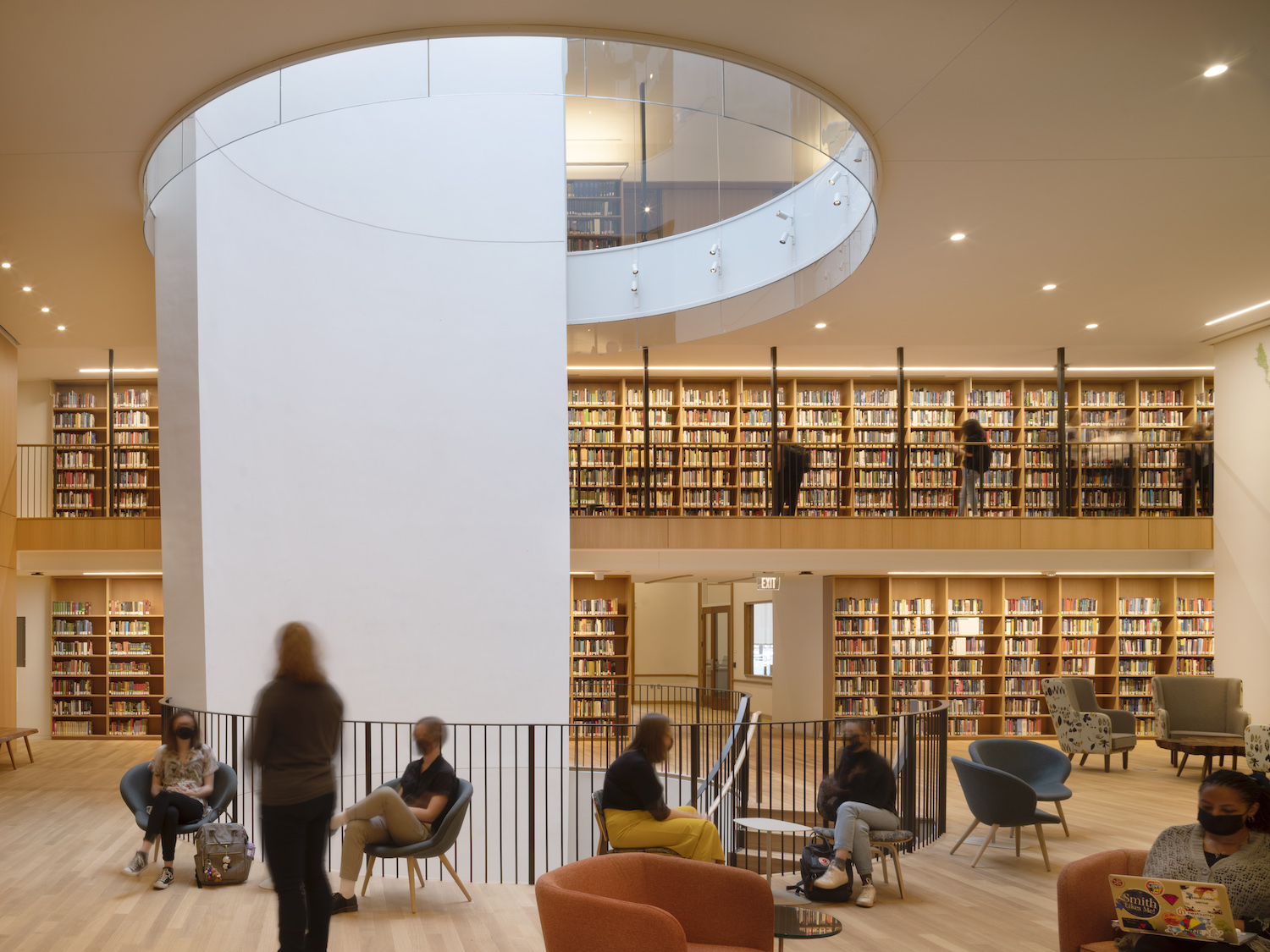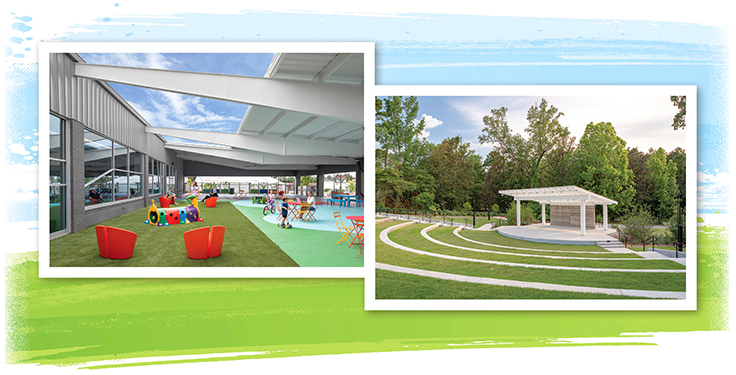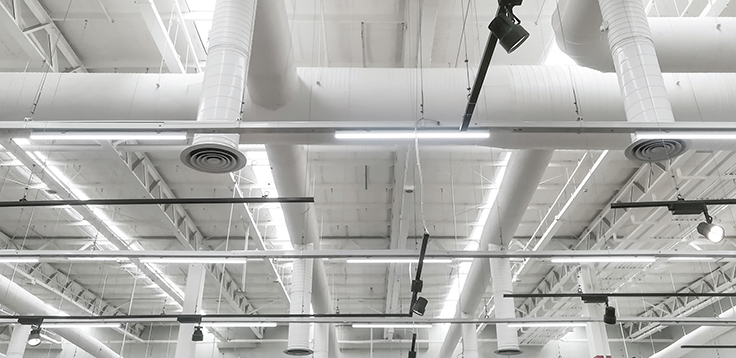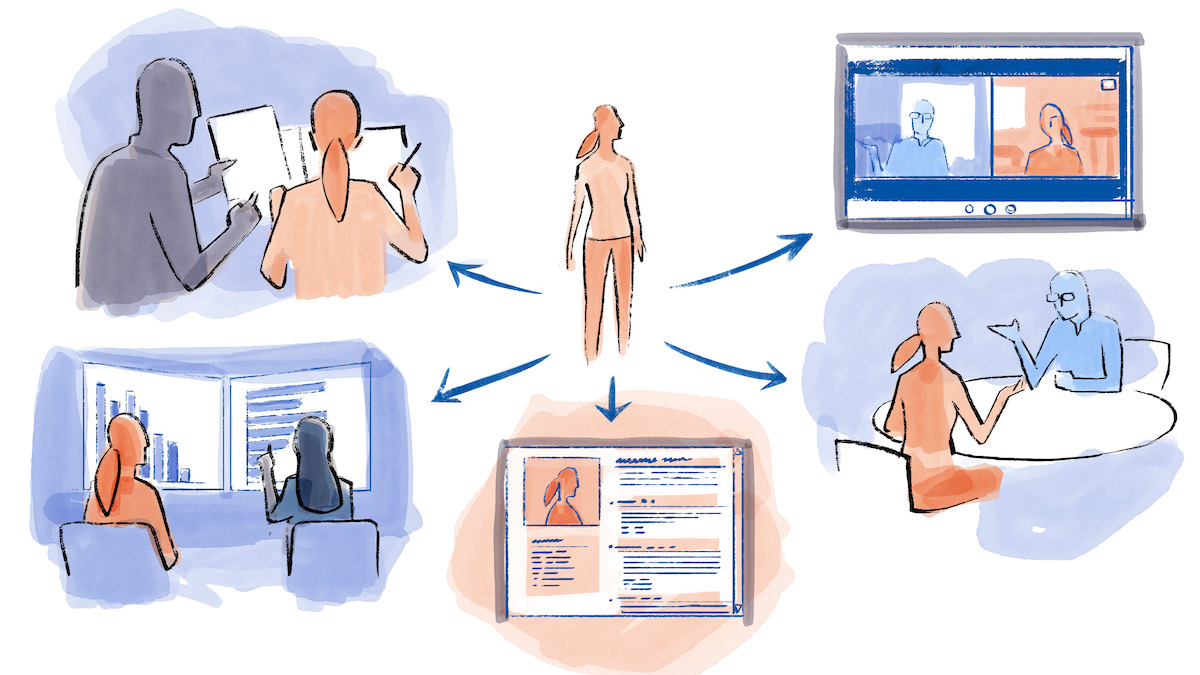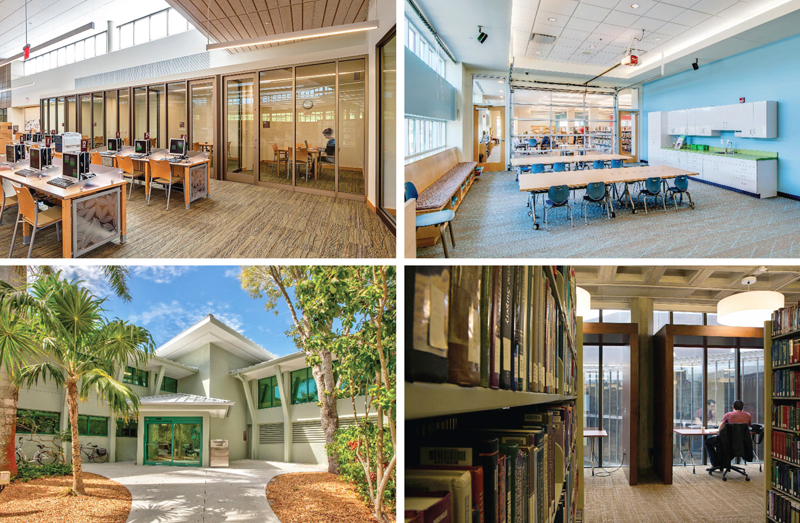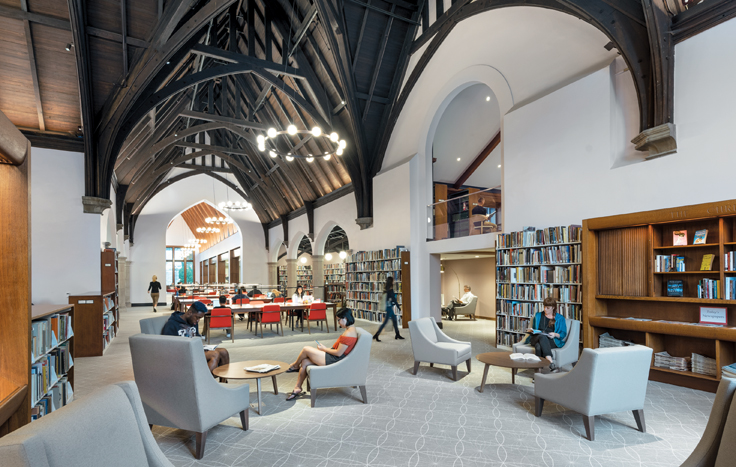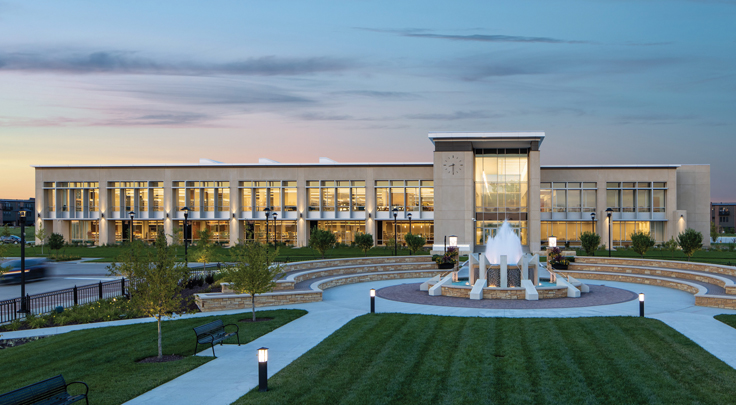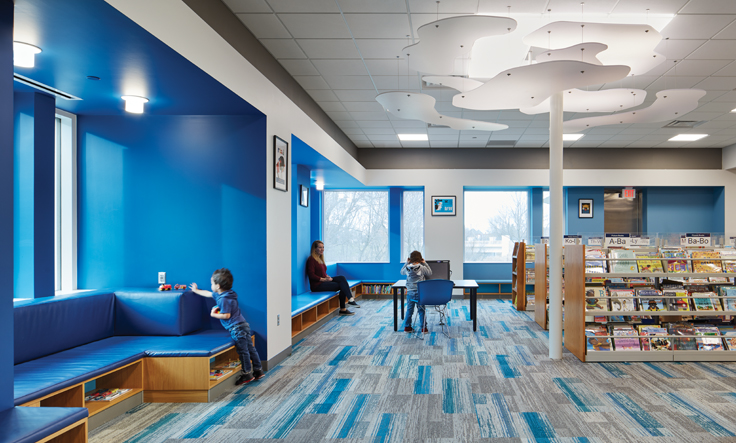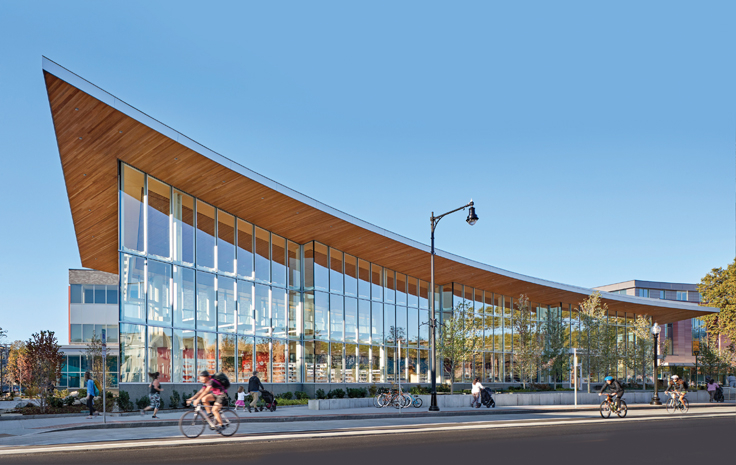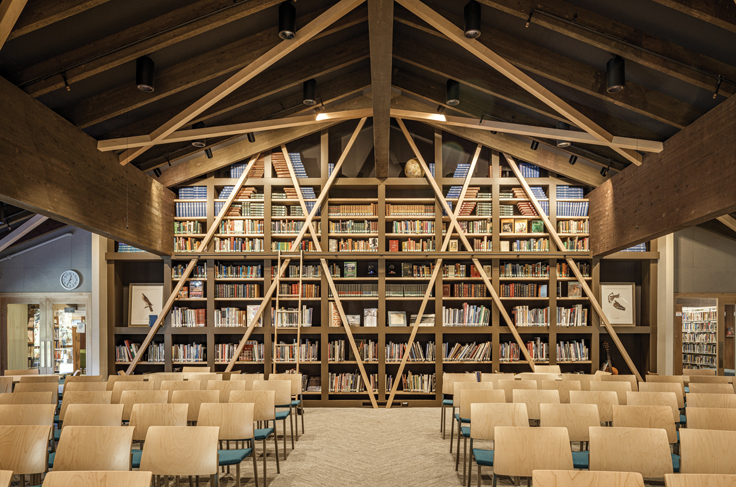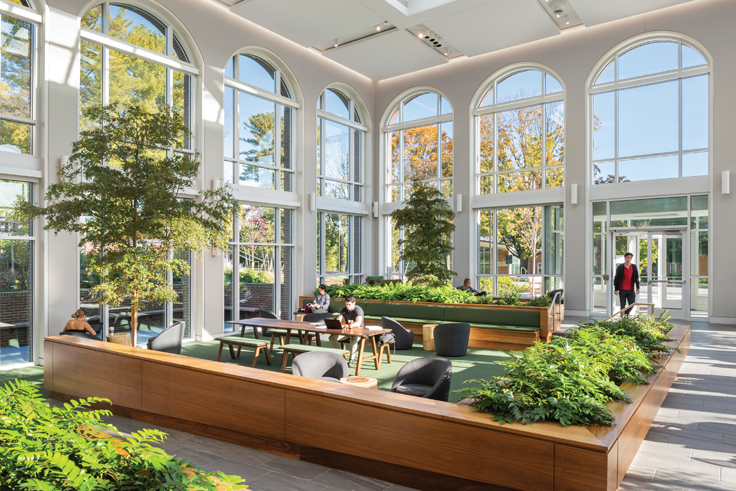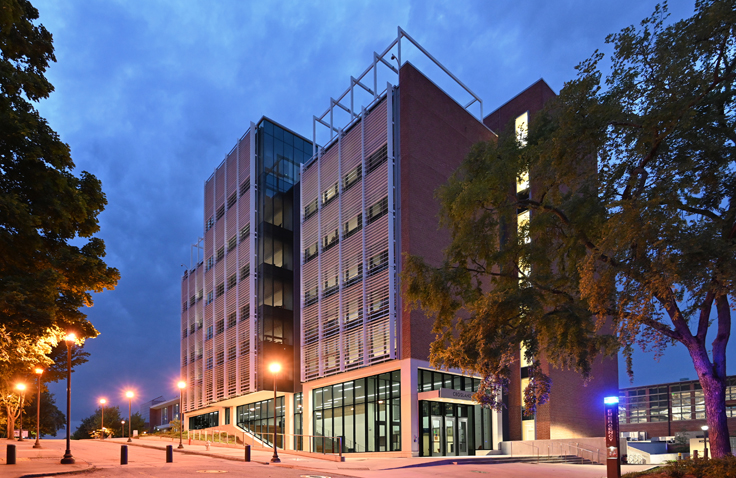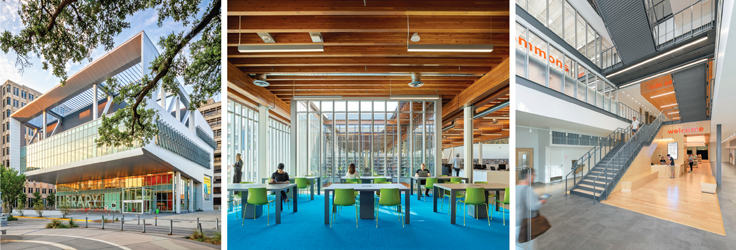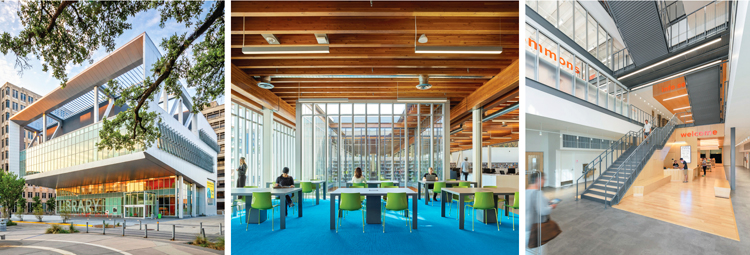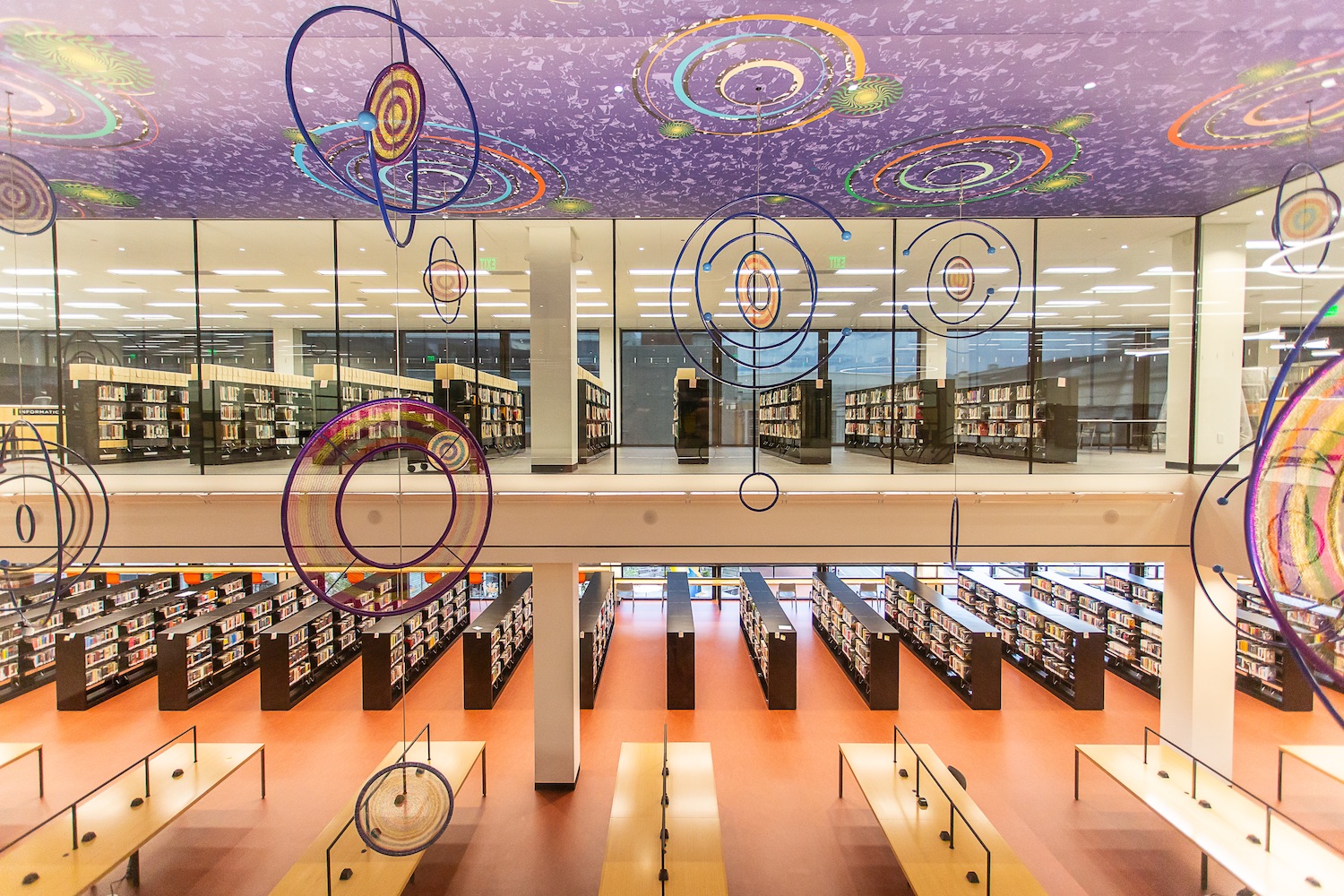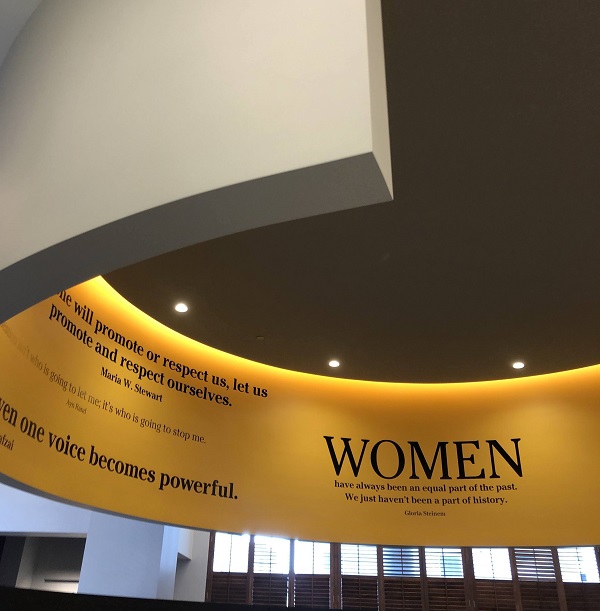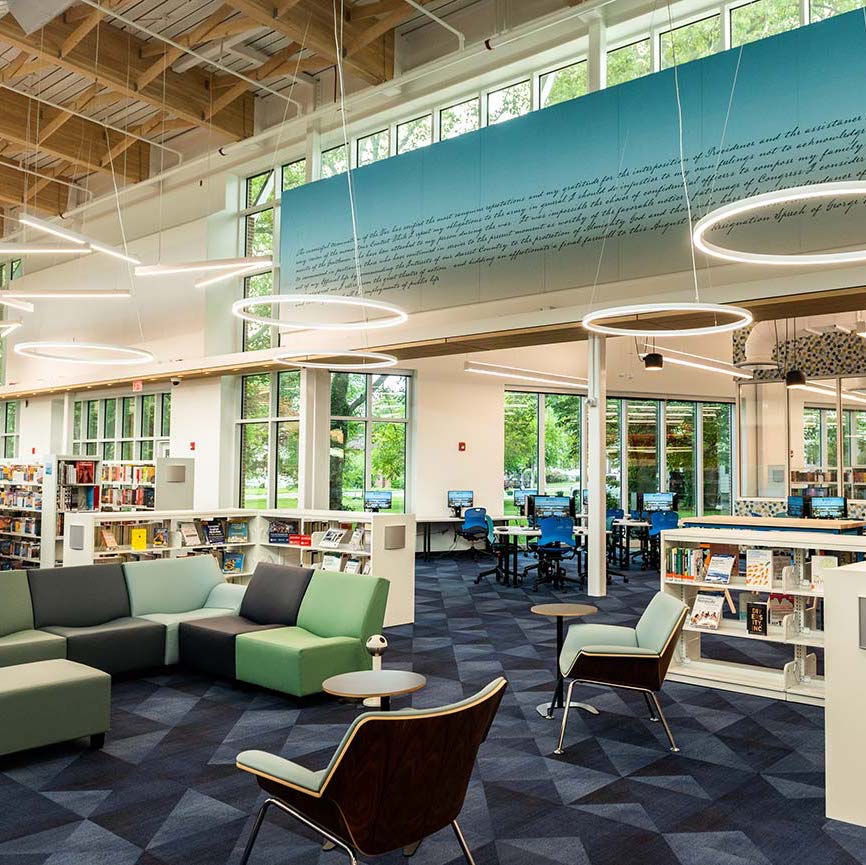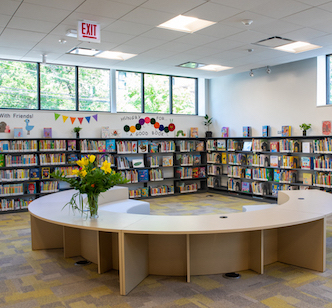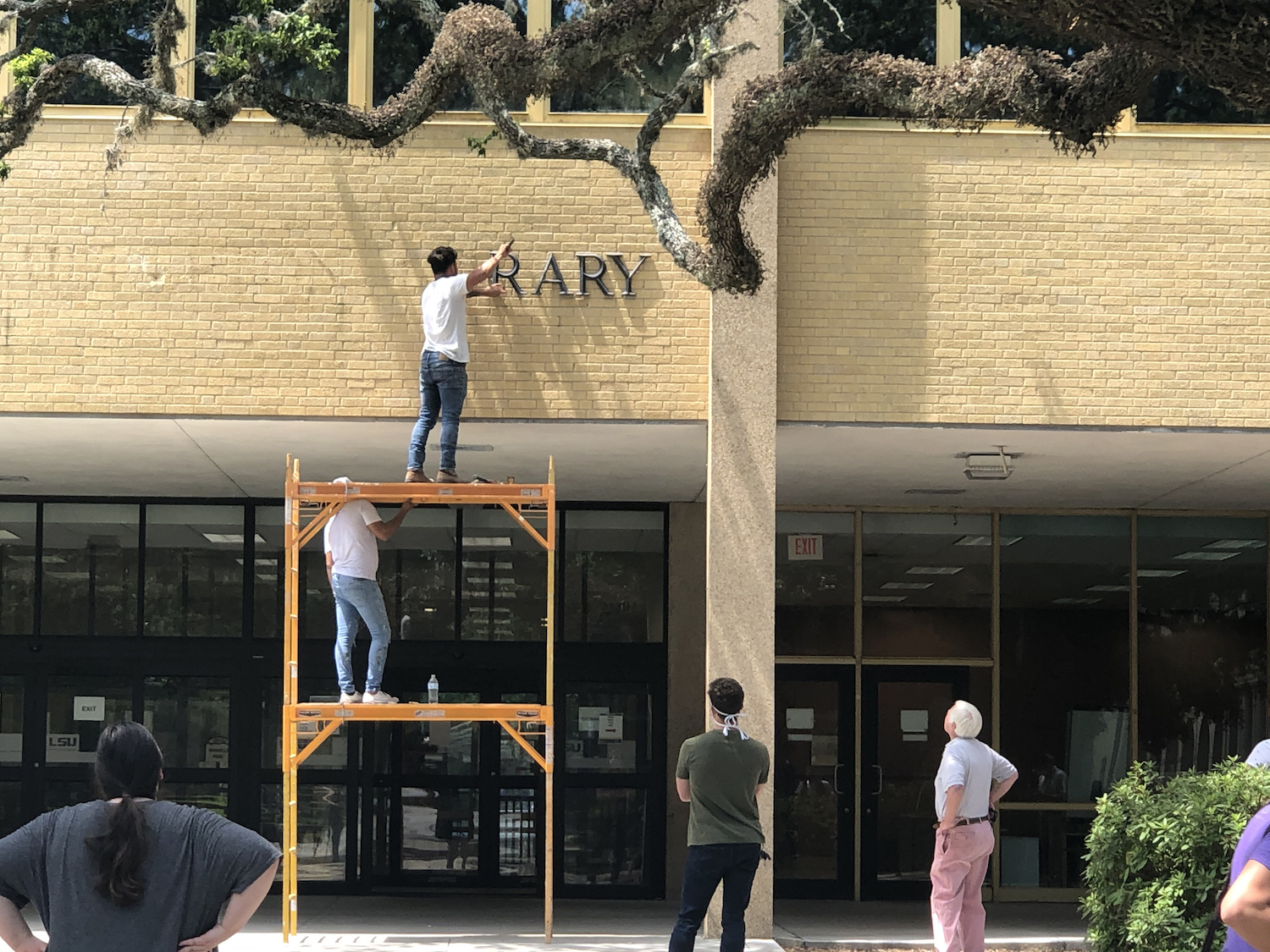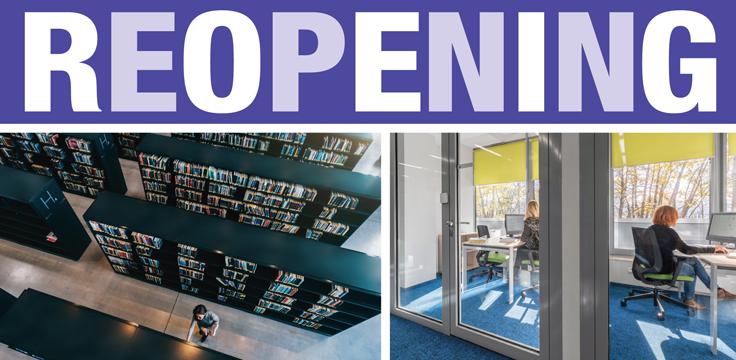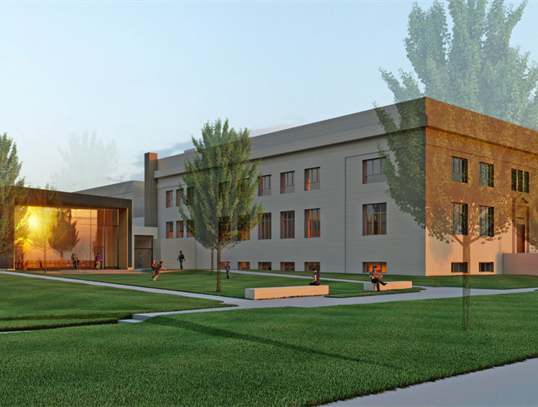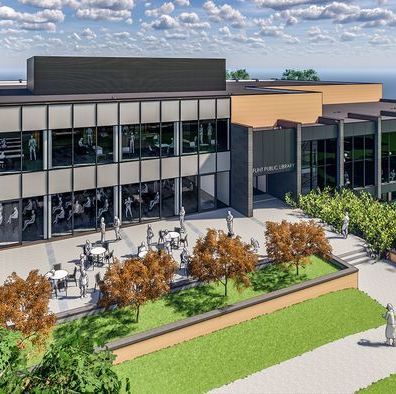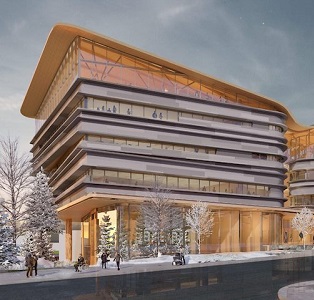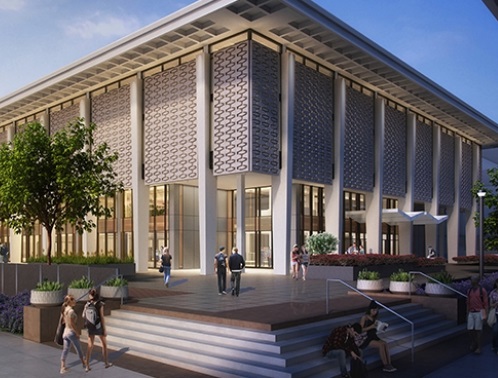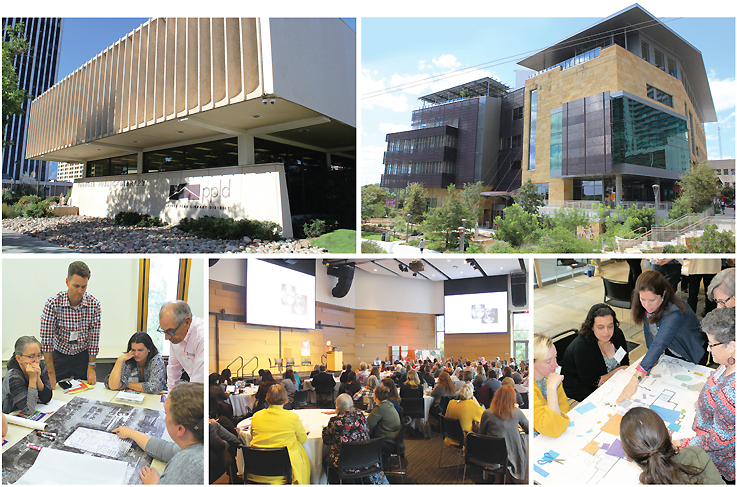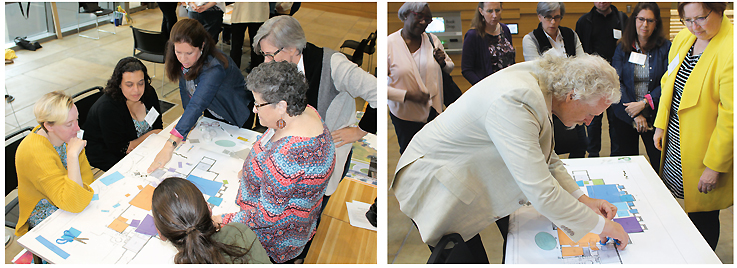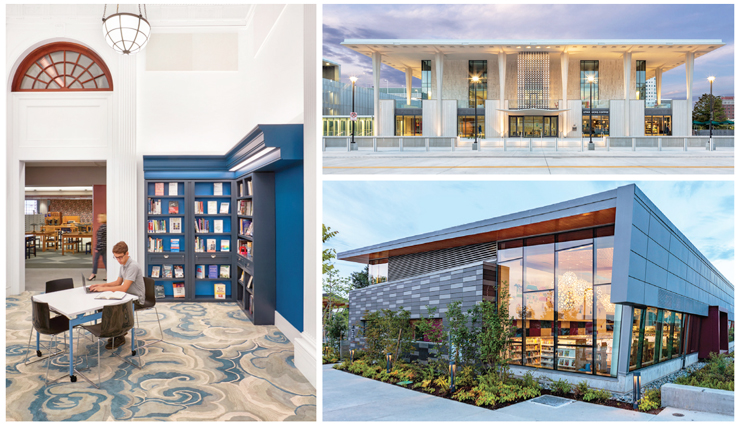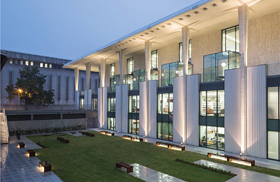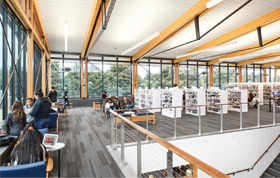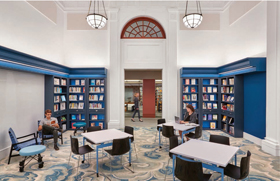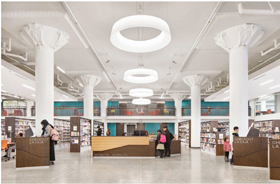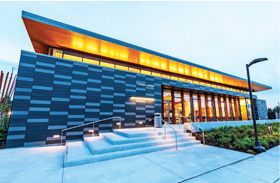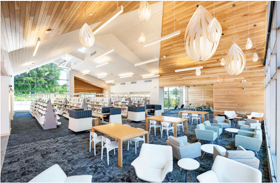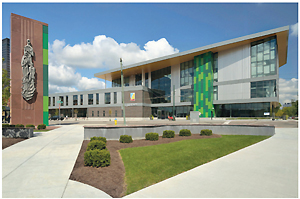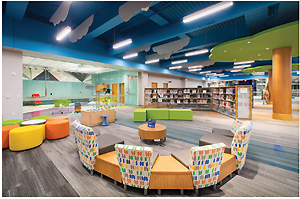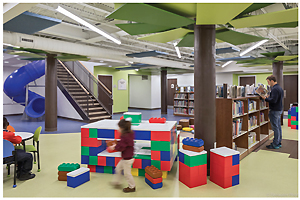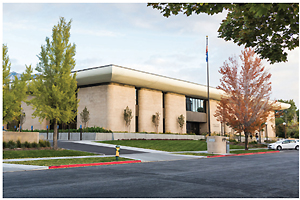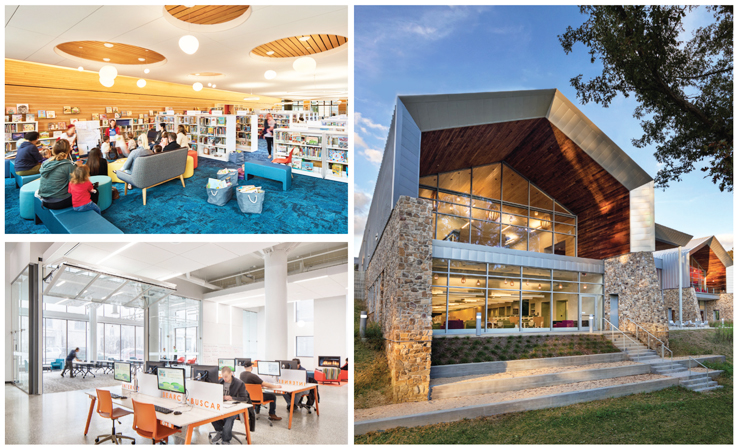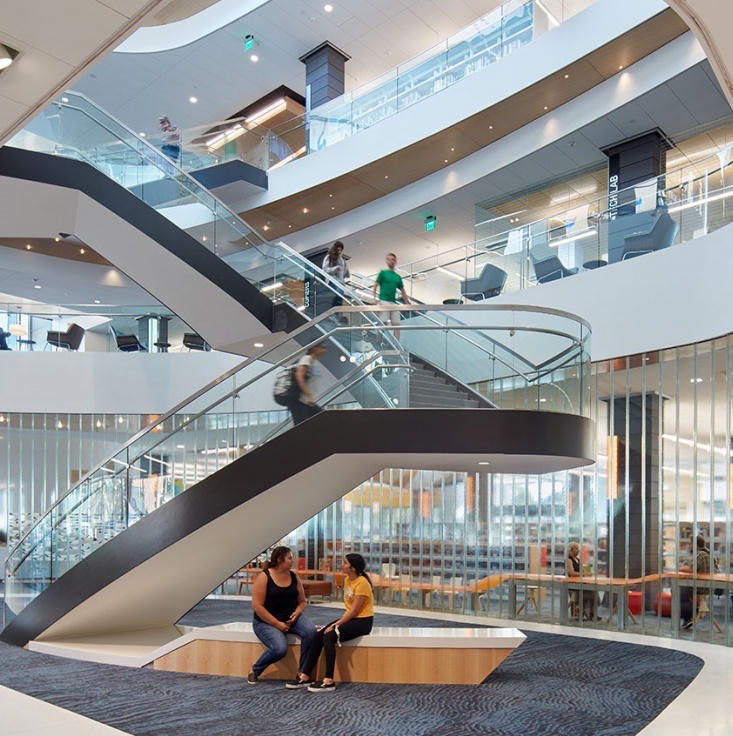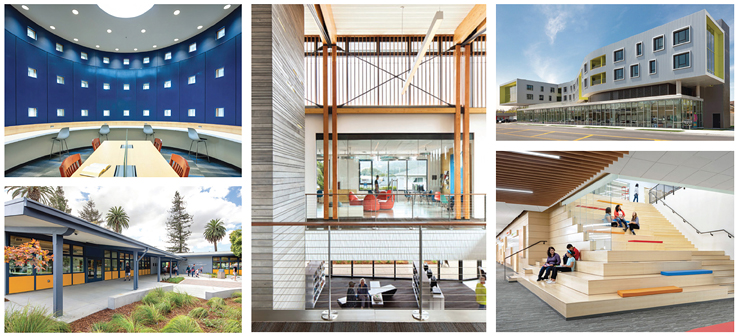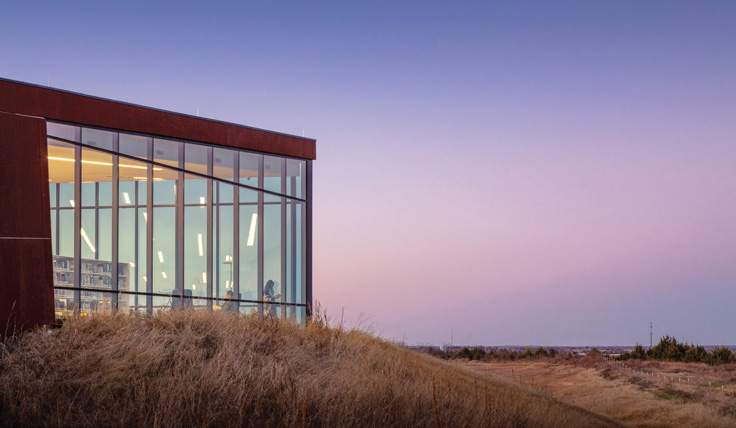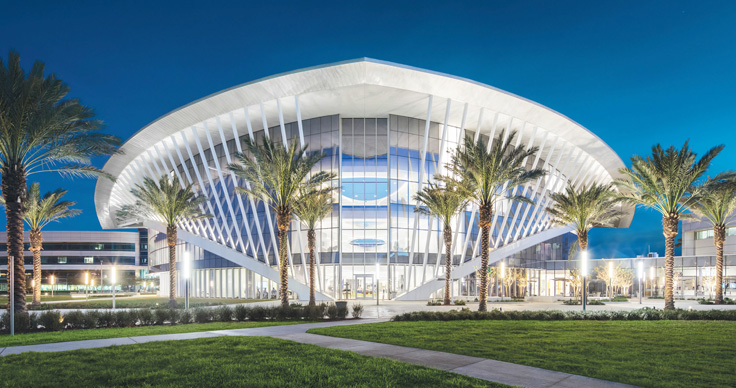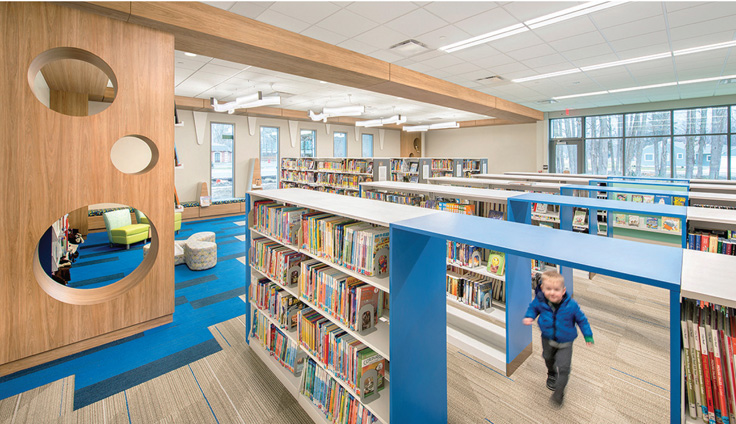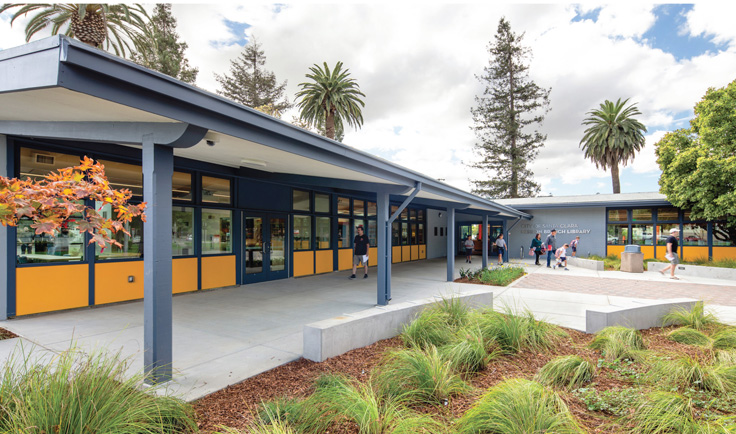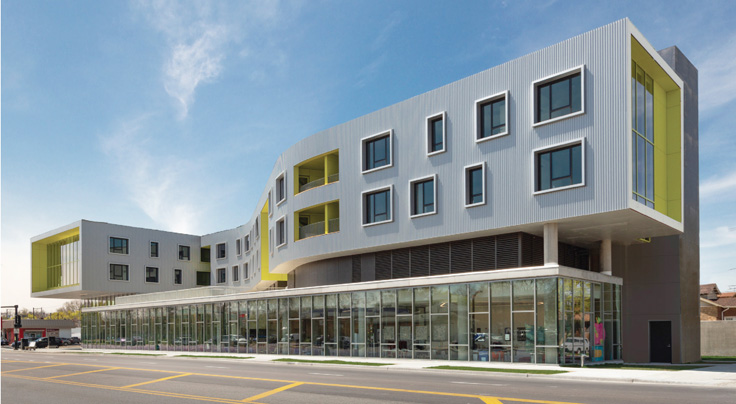Related
LJ’s 2024 Year in Architecture trends see libraries simultaneously designing for pragmatic concerns, such as safety and site constraints, and an equally important quotient of delight—achieving harmony in the process!
Color, color everywhere! To create welcoming, dynamic spaces, libraries have integrated vivid colors into their designs to connect, invite, comfort, and even surprise.
This year’s crop of libraries demonstrates a continued commitment to the well-being of library workers and patrons through biophilic design, a tried-and-true construct to connect people with nature in hopes of improving human health.
The successful renovation of a historic structure for contemporary use is a vivid example of how libraries respond to rapidly evolving community conditions. This year, a variety of approaches create modern facilities that honor history.
Designing for delight and flexibility is demonstrated in many of this year’s submissions, fostering gathering, play, and communal experiences.
As libraries expand into community hubs serving multiple purposes, they have introduced playfulness into their designs to encourage exploration, discovery, and above all, wonder.
Libraries continue to emerge from the pandemic, with spaces designed to promote social interaction along with quiet study—places that work for everyone.
LJ’s 2024 Year in Architecture trends see libraries simultaneously designing for pragmatic concerns, such as safety and site constraints, and an equally important quotient of delight—achieving harmony in the process!
The data for new academic library buildings and renovations featured in LJ's Year in Architecture 2024.
The data for new public library buildings and renovations featured in LJ's Year in Architecture 2024.
How old is your library? In 2021, the American Library Association reported that the average library building is over 40 years old and that the nation’s 17,000 public libraries would need approximately $32 billion dollars for construction and renovation over the next 25 years.
Spokane Public Library, WA, served as both host for Library Journal’s May 9 Design Institute and—using its creative and community-responsive systemwide redesigns and new construction as a jumping-off point—the inspiration for many of the day’s discussions. Fortunately, the conversation didn’t end there. LJ circled round with participants to find out what knowledge they brought back from Design Institute and what trends they think libraries looking to build, renovate, or retrofit their spaces should be keeping an eye on.
Design Institute Hayward looked at ways to design for inclusion, safety, sustainability, and extending a warm invitation to all.
At LJ’s 2023 Design Institute in Hayward, CA, held at the Hayward Public Library on September 28, five libraries in California and New Mexico enlisted architects and attendees to brainstorm on upcoming library design challenges.
A palpable sense of celebration and cultural sensitivity is evident through color, choice of fabric, and the architectural program. These renovations and builds are anything but utilitarian, incorporating thoughtful details like imagery, materiality, and type into their spaces.
Trends in meeting and reading rooms suggest attention to shifts in remote and hybrid work environments. Built-in shelves, long wooden tables with integrated lighting, and classic wooden chairs make a comeback with contemporary twists.
Gone are the rows upon rows of tall, fixed shelving in large, open areas. Custom-designed, small-scale shelving offers variety, sightlines, flexibility, and enhanced wayfinding, refining and evolving the concept of flexible, modular zones.
A vibrancy of colors can be seen among the new builds and renovations. Pastels merge with saturated primary colors; lush organic hues and shapes fill reading nooks; and bold colors mark service areas and desks, key spaces to congregate, or alcoves to retreat into.
As many have grown accustomed to spending more time at home, libraries continue to incorporate accessible, small-massed, and residential design elements. Buildings include vaulted roofs and window bump-outs; interiors feature plush carpeting, integrated display shelving in meeting rooms or small reading areas, and cozy fireplaces.
Projects continue to integrate exterior spaces, offering patrons not only outdoor seating but also creative use of the grounds, plus an integration of experience built into the wayfinding, aesthetic, and interior layout within open areas.
Colors that pop, sophisticated meeting spaces, residential design elements, and more in this year’s top library design trends.
Furniture echoes architectural elements; places of refuge get playful, and more of the year’s top library design trends. It’s all about flow. Rooms within rooms, nooks, delightful retreats for all ages are designed to seamlessly transition spaces from one function to another in this year’s round up of library renovations and new buildings. While we still see the subdued natural color palettes of last year’s trendsetters, color continues to play a meaningful role in these libraries.
The data for new academic library buildings and renovations featured in LJ's Year in Architecture 2023.
The data for new public library buildings and renovations featured in LJ's Year in Architecture 2023.
Design Institute Durham, held at the Durham County Library, NC, highlighted the need for ongoing communication among designers, architects, and libraries during all phases of a project.
At LJ’s 2023 Design Institute in Durham, NC, held at the Durham County Library on June 1, four libraries in Michigan, Alabama, and North Carolina enlisted architects and attendees to brainstorm on upcoming library design challenges.
As library designers, we must meet that challenge by understanding and providing for the needs of the communities the library serves. Main Libraries are often large and centrally located as the hub of the system. Usually located in the population center, often in a major city or town.
The idea of libraries built in parks or community centers is not new. What is less common, however, is the idea of not just collocating but blending facilities together to create more opportunities for collaboration across governmental units. That idea is being put into place in New Jersey, Virginia, and Colorado, among other places, where public librarians have found ways to join community services and parks and recreation departments to create blended facilities.
At LJ’s 2022 Design Institute in Missoula, MT held at the Missoula Public Library on September 29, five libraries in Idaho, Montana, Minnesota, Oregon, and California enlisted architects and attendees to brainstorm on upcoming library design challenges.
LJ’s Design Institute in Missoula, MT, tackled new needs, tools, and techniques for library design in inspiring surroundings.
Furniture echoes architectural elements; places of refuge get playful, and more of the year’s top library design trends.
Across many library spaces and settings, furnishings, finishes, and fixtures are tightly coordinated, both in shape and in style, to create a cohesive, seamless experience between more public and more private areas in the library.
Shelving design continues to evolve to support the visual narrative and personality of library spaces, from whimsical interactive shelves with cubby holes and twists and turns to shelves that offer integrated seating, display, and collections.
While peaceful nooks for concentrating, enjoying the scenery, or getting work done are now standards for library design, these libraries feature unique and inspiring spaces within spaces that create a whole new experience within the library for their communities.
This year’s libraries emphasize entrances by visually drawing community members into and through their doors with light, color, height, and plenty of glass or openings throughout their buildings so people can find where they want to go.
Furniture echoes architectural elements; places of refuge get playful, and more of the year’s top library design trends. It’s all about flow. Rooms within rooms, nooks, delightful retreats for all ages are designed to seamlessly transition spaces from one function to another in this year’s round up of library renovations and new buildings. While we still see the subdued natural color palettes of last year’s trendsetters, color continues to play a meaningful role in these libraries.
The data for new academic library buildings and renovations featured in LJ's Year in Architecture 2022.
The data for new public library buildings and renovations featured in LJ's Year in Architecture 2022.
At LJ’s 2022 Design Institute in New York City, held at the New York Public Library's Stavros Niarchos Foundation Library on June 9, five libraries in Pennsylvania, Oklahoma, Illinois, Connecticut, and New Jersey enlisted architects and attendees to brainstorm on upcoming library design challenges.
After a two-year COVID hiatus on in-person events, LJ’s Design Institute returned to in-person convenings at New York Public Library’s reimagined flagship circulating library.
From open outdoor areas to fantastic and functional fixtures, sustainable systems to study spaces, LJ's 2021 Year in Architecture roundup celebrates the best new construction and renovation in public and academic libraries across the country.
The data for new public library buildings and renovations featured in LJ's Year in Architecture 2021.
A re-envisioned Hayden Library and courtyard at MIT, fresh film archives at Yale, Brooklyn PL unveils its first new branch in 40 years, Columbus Metropolitan Library cuts the ribbon on its HIlltop Branch, and more library construction news.
Smith College and Kansas State reopen libraries after extensive renovations and Brooklyn, East Asheville, and the Carnegie Library of Pittsburg unveil substantial remodels.
Even before the pandemic, outdoor spaces on library grounds were trending. Now, although the vaccine rollout is well underway, it will likely be fall at the earliest before most libraries resume indoor programming. What was a nice-to-have luxury has become the only game in town.
HVAC systems may be an important tool for reducing COVID risk in library buildings; the details make all the difference.
How will COVID-19 change how libraries offer their collections and services in the long term? How will it change the nature of our work? This article provides a vision of the future in which libraries become true connectors of people and catalysts for discovery.
In today's day and age of the COVID pandemic, job loss, increased violence, and weather-related incidences, the Community Library has become more important than ever. People flock to libraries as a lifeline in times of need.
Spaces for distinct activities in pavilions, wings, or adjacent areas are smartly configured for cross-pollination without disruption in new and renovated libraries.
Advances in technology and creative use allow libraries to define spaces, add color, and control noise without any walls.
Reading nooks, custom millwork, and generous use of graphic design pull together aesthetic across library interiors.
Enclosed glass spaces allow insight into what’s going on at the library as well as offering a visual connection to the surrounding community, while moveable walls that literally open onto the outside go a step further.
Features inspired by residential designs continue to offer comfort and informal areas to relax and connect.
Cues from the natural landscape come inside, seating and programming go out, as libraries continue to connect indoors and out.
Despite the delays and complications of the pandemic, many libraries persevered to debut new and renovated buildings this year. Playful, dynamic lighting, relaxed and inviting outdoor spaces, light-filled and visible interiors with embedded technology, and smart, sustainable infrastructure are this year’s top trends.
From open outdoor areas to fantastic and functional fixtures, sustainable systems to to study spaces, LJ's 2020 Year in Architecture roundup celebrates the best new construction and renovation in public and academic libraries across the country.
Work has wrapped up at DC, Boston, and Brooklyn Public Library branches; construction proceeds on schedule at Spokane and Mid-Continent Public Libraries, and the Theodore Roosevelt Presidential Library has chosen Snøhetta as its design firm.
In 2020, the Nashville Public Library (NPL) looked to expand its Civil Right Center with a new Votes For Women room. After 18 months of planning, the grand opening was scheduled to coincide with the 100th anniversary of the ratification of the Nineteenth Amendment, which cleared the way for women to vote. As the COVID-19 pandemic evolved, the NPL realized that the grand celebrations envisioned would not be possible.
New Libraries open at Anne Arundel County, Edmonton, and East Baton Rouge Parish; work is almost finished at the Joseph Anderson Cook Library on the University of Southern Mississippi’s (USM) Hattiesburg campus; Bayport is transforming a convent into a "world-class" library; and Michael Bloomberg has given a large gift to help build a new Medford PL.
Chicago Public Library's Merlo Branch and Indianapolis PL's Martindale-Brightwood Branch have opened to the public, while work is proceeding—after some delays—on St. Louis County PL's Eureka Hills Branch, the new North Branch of Clinton-Macomb PL, and Carroll County PL's Exploration Commons.
As calls for accountability are amplified across the country, many institutions are starting by addressing their racist history—many of which involved naming rights for funders or founders. Recently the Board of Supervisors of Louisiana State University (LSU) unanimously voted to remove the name of former university president Troy H. Middleton, whose 1961 correspondence stated his wish to keep the school segregated, from the LSU Library.
In addition to enhanced cleaning protocols, training, and the public use of personal protective equipment like face coverings, the impacts of coronavirus are transforming how we design public spaces in the short and long term.
Construction work is scheduled for the Public Library of Youngstown and Mahoning County, OH, and Saugatuck-Douglas District Library, MI; Paramus Public Library has applied for NJ Construction Bond funding; and yes, there's a podcast for everything—now, a new library construction podcast from the Massachusetts Public Library Construction Program.
COVID-19 causes construction delays for Flint Public Library, MI, and Carroll Public Library, IA; Saskatoon PL purchases property for new Central Library; Eden Prairie Branch of Hennepin County Library, MN, and Felton Branch of Santa Cruz Public Library, CA, see grand reopenings before library closures.
For some stuck at home, with travel and everyday library visits alike on indefinite hiatus as society works to flatten the curve of COVID-19 infections, virtual tourism has become a lifeline. It offers beauty, expanse, culture, and a momentary escape from anxiety. These eight of the world’s most beautiful—as well as a few of the most out-there—libraries are a click away for now and a bucket list destination for the future.
The design for Ontario’s Ottawa Public Library and Library and Archives Canada is unveiled, Babson College’s Horn Library gets a new Commons, St. Charles Public Library District will join three sections of the library, and the unBound Library Branch of Meridian Library District, ID, is scheduled to reopen in a new location this fall.
Arizona State University's Hayden Library reopens, MIT's Hayden Library plans a renovation, Deschutes PL acquires new land, and the Public Library of Cincinnati and Hamilton County launches a multiyear system-wide improvement project.
When creating sustainable library designs, planners start by looking at elements that can be reused. Much inspired and practical design has emerged by repurposing and building on or around what already exists: structures, materials, public spaces, personnel—and, as two recent Library Journal Design Institutes in Colorado Springs and Austin demonstrated—community.
At LJ’s 2019 Design Institutes in Colorado Springs, CO, held at the Pikes Peak Library District (PPLD) on September 13, four public libraries in California, Idaho, Texas, and Arizona enlisted architects and attendees to brainstorm on upcoming library design challenges.
The 2019 New Landmark Libraries celebrates six paradigm-shifting public libraries designed around their communities' changing needs.
The Central Library branch of Tulsa City-County Library, OK, is one of six winners of our New Landmark Libraries for 2019. Its $55 million renovation transformed the original library and created an event space for 400, an interactive and expansive outdoor plaza, and 26 percent more public programming across its five stories. In collaboration with the city, the project was intentionally designed to revitalize the downtown core.
The Half Moon Bay Library of San Mateo County Libraries, CA, is one of six winners of our New Landmark Libraries for 2019. The new building, certified as Zero Net Energy and LEED Platinum, is the culmination of 20 years of planning, engagement, and design led by the library system in collaboration with Noll & Tam Architects.
The Ives Squared Library, part of the New Haven Free Public Library, is one of six winners of our New Landmark Libraries for 2019. The $1.5 million renovation aimed to launch a nexus of creativity based on design thinking. Community co-creation led the visioning process that resulted in the 4,700 square foot 21st century Maker space and public salon.
The Mitchell Street Branch of the Milwaukee Public Library, WI, is one of six winners of our New Landmark Libraries for 2019. HGA architects designed the former historic 1919 department store around user needs: They refinished the mezzanine and improved sightlines, updated mechanical systems and improved air quality, and added vibrant patterns, and created a Maker and community kitchen space for experimentation, learning, and connection.
The Tukwila Library, part of the King County Library, WA, is one of six winners of our New Landmark Libraries for 2019. Perkins & Will designed the branch to celebrate and support the diverse community, which was so engaged in the planning that it raised money to expand the building's footprint to 10,000 square feet. The building is the first phase of the town's mixed-use urban renewal project. Locally sourced materials, a negative-carbon footprint roof, and geothermal heating are used in the design, recognized by Sustainable Seattle.
The Varina Area Library branch of the Henrico County Public Libary, VA, is one of six winners of our New Landmark Libraries for 2019. The new building, on 22 acres of wooded land, combines the vernacular architecture of the region with the rural character of the landscape. The design includes multifunctional spaces, a digital media lab, an all-ages collaboration zone, and a grand staircase for media viewings and talks. Since the 2017 opening, visits and programming have increased by 188 and 481 percent, respectively.
The Dayton Main Library, part of the Dayton Metro Library, OH, is one of four honorable mentions for New Landmark Libraries for 2019. The building, in the once-dilapidated Cooper Park and on the Miami-Erie Canal, was almost entirely repurposed. Echoing the region's engineering annd nautical heritage, bridges cross the atrium and visually connect the space, which opens to a three-story atrium featuring a grand staircase. The library now includes flexible spaces, a business incubator, and a theater.
The Advanced Learning Library, a branch of the Wichita Public Library, KS, is one of four honorable mentions for New Landmark Libraries for 2019. Sited at the Arkansas River, the library activates a once-abandoned industrial lot and includes 25 collaboration spaces and themed pavilions to suit the needs of the community.
The Union County Carnegie Library, SC, is one of four honorable mentions for New Landmark Libraries for 2019. In addition to its historic renovation, the library now includes spaces for workforce development and United Way services, and is the county's only ADA-accessible public building, which provides safe spaces for diverse populations.
Weber County Main Library, a branch of the Weber County Library System, UT, is one of four honorable mentions for New Landmark Libraries for 2019. The project reclaimed 110,000 and added 5,000 square feet of the 1968 library, recognized by Preservation Utah as an exemplar of New Formalist design and mid-century modern architecture.
The Hayward Public Library, CA, opened its new Hayward Library and Community Learning Center; Yale University has completed renovations to its Anne T. and Robert M. Bass Library; Charlotte Mecklenburg Library, NC, unveiled design plans on November 7 for its $100 million Main Library; and more new construction and renovation news from the December 2019 issue of Library Journal.
From open outdoor areas to fantastic and functional fixtures, sustainable systems to to study spaces, LJ's 2019 Year in Architecture roundup celebrates the best new construction and renovation in public and academic libraries across the country.
The Norman Public Library East branch of the Pioneer Library System, OK; Temple University’s Charles Library; Westport Library, CT; and Brambleton Library, Loudon County, VA.
The Jack R. Hunt Library at Embry-Riddle Aeronautical University, Daytona Beach, FL; Princeton University’s Firestone Library; and the Cheryl and Philip Milstein Center for Teaching and Learning at Barnard College, NY.
The Centennial Branch of the Anoka County Library, MN; the South Branch of Cleveland Public Library; Auglaize County Library’s Wapakoneta Branch, OH; and Baldwin Borough Public Library, Pittsburgh.
Toledo Lucas County Public Library’s Mott branch, OH; Thornhill Branch, St. Louis County Library, MO; Michigan Road Branch of the Indianapolis Public Library, IN; and Lenexa City Center Library, KS.
Sanibel Public Library, FL; Borrego Springs Library of San Diego County Library, CA; Gutekunst Public Library, IA; Mission Branch Library of the City of Santa Clara Library System, CA; and the Dublin Branch of the Columbus Metropolitan Library, OH.
Galaxie Library, Dakota County Library, Apple Valley, MN; Keene Public Library, NH; Chicago Public Library’s Northtown Branch; Half Moon Bay Library, CA; and the Missouri City Branch Library, Fort Bend County Libraries, TX.
ALREADY A SUBSCRIBER? LOG IN
We are currently offering this content for free. Sign up now to activate your personal profile, where you can save articles for future viewing

